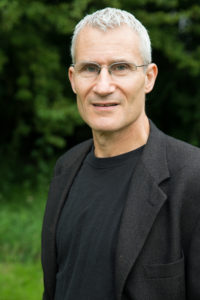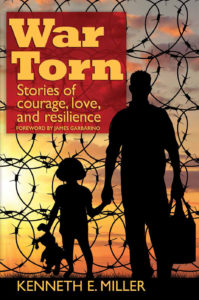War Torn: Stories of Courage, Love, and Resilience by Kenneth E. Miller
Publisher: Larson Publications (October 17, 2016) Category: Non-Fiction, PTSD, Current Events/World Affairs, Political Science: Genocide and War Crimes Tour Date: Oct and Nov, 2016 ISBN: 978-1936012787 Available in: Print, 296 Pages With some 200 million people in more than forty countries affected by armed conflict or genocide, refugees are appearing in record numbers. War Torn is timely in how it brings us intimately into the lives of civilians who have survived wars in Afghanistan, Iraq, Bosnia, Guatemala, and Sri Lanka. Alongside stories that convey intimately the destruction and heartbreak of armed conflict, Miller captures the courage and resilience he calls “a remarkable kind of light,” an essential counterpoint to the grief and trauma that war creates. The stories in War Torn are powerful, heart-wrenching, and unforgettable.
With some 200 million people in more than forty countries affected by armed conflict or genocide, refugees are appearing in record numbers. War Torn is timely in how it brings us intimately into the lives of civilians who have survived wars in Afghanistan, Iraq, Bosnia, Guatemala, and Sri Lanka. Alongside stories that convey intimately the destruction and heartbreak of armed conflict, Miller captures the courage and resilience he calls “a remarkable kind of light,” an essential counterpoint to the grief and trauma that war creates. The stories in War Torn are powerful, heart-wrenching, and unforgettable.Advance Praise for War Torn by Kenneth E. Miller
"This is an eye-opening study. Psychologist Kenneth E. Miller and his wife Debbie began collecting data and teaching volunteers in refugee camps around the world back in 1991. In reality, there are almost 200 million people in over 40 countries impacted by war and genocide, living day to day exiled from their homes, families, and lifestyles. Kenneth Miller brings us their stories. This is a book I will read again, and share with my children. This is a worldwide problem we all need to understand, and address."- Bonnye Reed, GoodReads Reviewer “You could find no better guide than Ken Miller to illuminate this dark territory. A skilled story teller, he has an eye for nuance that is often missing in our cultural conversation about PTSD. I put down this book with a heart that was broken but also filled with hope. “-Ethan Watters, Author of Crazy Like Us and Co-founder of the San Francisco Writers' Grotto. “War Torn is an exceptional, gripping account of the impact of war—a must-read for anyone interested in how war profoundly touches and shapes people. Ken Miller merges the expressive writing of a novelist with compassion and the profound understanding of a seasoned mental health professional. This collection of personal experiences and mosaic of situations provides rich and unique insights into the complexities of war torn countries.”-Dr. Mark Jordans, King’s College London "Ken Miller weaves together for us tragic stories of war, loss and injustice with tales of friendship, family, and laughter. Ken's gift is the way he listens, which takes him and his readers beyond simple categories of war victim or trauma to the complex experiences people have in settings torn apart by violence. I'm grateful for the way he has captured the simultaneously disabling and inspiring coexistence of darkness and light in these places." -Jeannie Annan, PhD, Director of Research, Evaluation, and Learning at the International Rescue Committee
 About Kenneth E. Miller
About Kenneth E. Miller
An international expert on the impact of armed conflict on civilians, psychologist Kenneth E. Miller has been working with war-affected communities since 1991 as a researcher, clinician, organizational consultant, and filmmaker. A professor of clinical and community psychology for much of his career (San Francisco State University, Pomona College), in 2015 he joined the Dutch NGO War Child Holland and is currently based in Amsterdam. Blog: https://drkenmiller.wordpress.com/ Website: www.kennethemiller.com Twitter: @kennethemiller LinkedIn: www.linkedin.com/in/kennethemiller01
Pre-order War Torn by Kenneth E. Miller
Amazon Barnes&Noble IndieBoundEXCERPT:
FROZEN GRIEF
My colleague Martín was intense and animated. He was a great storyteller, always pausing just long enough at key moments to build the suspense, then finishing with an ending that left you laughing, or in tears, or simply bewildered by the crazy things that happened in this country.
He came in one morning, dressed in his usual jeans and button-down shirt, looking agitated.
“Man,” he said, “you won’t believe this one, Ken.”
“Go on.”
He'd just heard about a woman, I'll call her Maria, maybe fifty years old, a Mayan Indian who lived in a small village near Lake Atitlan. The deepest lake in Central America, Atitlan is ringed by steep mountains that were thought to be home to armed guerillas during the war. That made the villages surrounding the lake hot targets for the army, whose strategy was to terrorize the villagers into submission and destroy any real or potential support they might be inclined to offer the guerrillas.
Maria’s teenage son had disappeared during the height of the army's scorched earth campaign. Soldiers took him away at gunpoint one night, along with several other young men from the community. Neither he nor any of the others abducted that night were ever seen or heard from again.
"That was ten years ago," Martín said.
He paused for a moment, collecting his thoughts, and then said, “The thing is, every week she cleans his room. Dusts it, wipes it down, sweeps it, keeps everything just as it was the day he was taken away. Just in case, you know, he comes back.
"Ten years, man,” he continued. “And she's still waiting for him to come home."
"That's a long time," I said. "No way that kid’s still alive."
"Right. No way." Martín paused a moment.
"Imagine that," he said. "Ten years and she's still waiting."
I saw the sadness in his face. We both knew what Maria couldn't bear to admit: her son was never coming back. He’d probably been dead for most of the past decade.
It’s a familiar story, lived out by thousands of families. People didn’t just disappear in Guatemala, they got disappeared. It’s something you did to someone, a transitive verb. El fue desaparecido, someone might say, “He was disappeared.” There’s no corresponding verb for reappearing, because people rarely reappeared. Sure, sometimes the disappeared did show up again, usually as a corpse on the side of a road, bearing signs of torture. But there was no need to invent a word for that.
Mostly, though, the disappeared remained that way.
That left families in a terrible state. What Maria was going through, cleaning her son’s room, holding on to hope despite the almost certain reality that he was no longer alive—it's a familiar syndrome in Latin America. Argentines lived through it so often that psychoanalyst Maria Langer coined the term “frozen grief” to describe the syndrome she saw among families of the disappeared.[1] It’s the painful uncertainty of not knowing a loved one’s fate, the anguish and guilt if they give up hope and finally let go. It can feel like an abandonment. You don't want to imagine your child or parent or cousin being tortured in some dark and lonely prison cell, but you also can't let go of the possibility that they might still be alive, and could somehow find their way home.
So people hold on, in a perpetual state of hope, even as they know, somewhere just below consciousness, that they're holding on to an illusion. As a result, they never really grieve. Healing gets put on hold indefinitely. A body would provide closure, however painful it might be. Whatever signs of violence it might bear, a corpse would end the uncertainty and help people move on with their lives. But it doesn't happen that way with disappearances; that's their particularly cruel legacy. You don't get to know.
Martín had heard stories like this before, hundreds of them. He lived through the worst years of the war, never left the country like a lot of his peers did. Just kept his head down at the university where he was finishing his degree, and hoped he wouldn't get targeted by the army like so many of his classmates and professors. He knew the stories, but for whatever reason, Maria's experience, the way she still cleaned her son's room in anticipation of his possible return, really got to him.
"He's never coming back, you know," Martín said.
"Right. I know. He's not. There's no way."
"And she can't see that," he continued. "Can't allow herself to see that." He shook his head, as if trying to clear the story from his mind, then poured himself some coffee and sat down at his desk.
Morning in Guatemala.
[1] Marie Langer, From Vienna to Managua: Journey of a Psychoanalyst. (London: Free Association, 1989).


5 comments:
Thanks for taking part in the tour!
Thanks for including me!
thanks for the excerpt and the discovery
Just thanks and have a lovely weekend!
You ladies are welcome!
Post a Comment